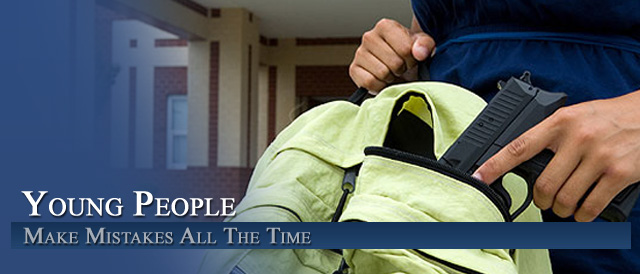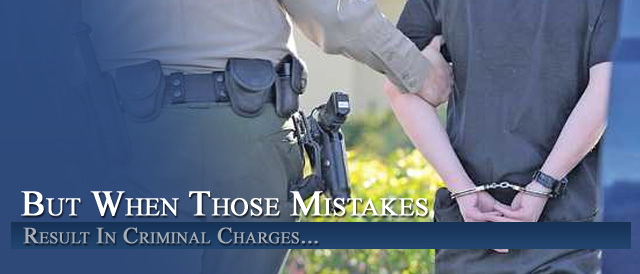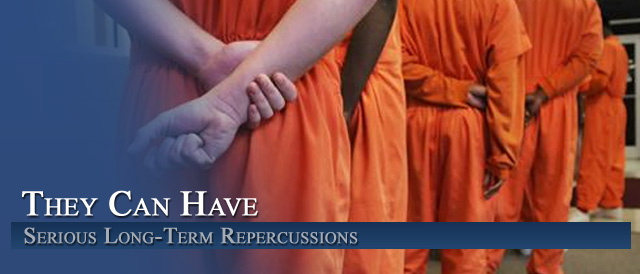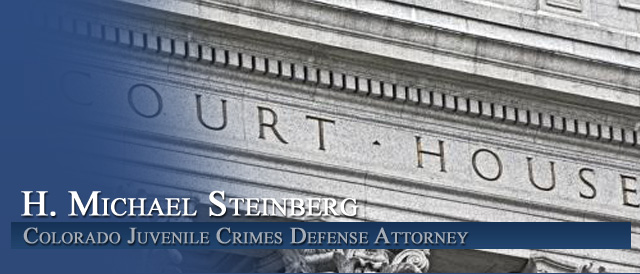




Colorado Juvenile Criminal Law – Why Children In Colorado Juvenile Court Should Be Unshackled – Unchained
By H. Michael Steinberg Colorado Juvenile Criminal Defense Lawyer

_________________
Colorado Juvenile Criminal Law – Why Children In Colorado Juvenile Court Should Be Unshackled – Unchained
Colorado Juvenile Criminal Law – Why Children In Colorado Juvenile Court Should Be Unshackled – Unchained – If you have ever been in a Colorado Juvenile Court when the “prisoners” are ushered in wearing chains and shackles you will never be the same. The sight is sickening.. These are sometimes the smallest most frail kids you will ever see. Many of them are young girls.
It is clear to anyone in the Colorado Juvenile Justice System that the use of shackles humiliates, stigmatizes, and traumatizes the children brought into the court system.
If you have not seen them – the shackles are made of metal, cloth, leather or plastic. The shackles used in Colorado are leg irons, belly chains and handcuffs. These restraints can weigh as much as 25 pounds. The children that have been shackled for Juvenile Court uniformly describe the practice of being shackled as if they are being treated “like an animal” or “like a criminal.¨ The parents of the children charged in Juvenile Court describe seeing their children in shackles as “heartbreaking.¨
This practice of shackling has to be stopped. The children who are arrested and brought in chains into juvenile court are often the most vulnerable to the terrible psychological impacts of the practice of shackling and the result of this experience is often lifelong and cumulative over time.
There Is No Reason To Shackle Children In The Colorado Juvenile Court System
The Goal Of Colorado Juvenile Court Is Rehabilitation – Shackling Is Punitive
There is imply no valid rationale for shackling juveniles. The goal in the juvenile justice system vs adult court – is rehabilitation. Shackling represents the opposite of that goal. It is retrogressive.
Mental health professionals and professional organizations uniformly oppose shacking.
The National Center of Mental Health and Juvenile Justice (NCMHJJ) has set the standards for reviewing when shackling should and should not be used. The NCMHJJ advocates for a zero shackling goal – or a presumption against shackling.
This organization sets the following standard for shackling:
A child should not be shackled for a court appearance unless the court, following a formal hearing for that purpose, makes the following findings;
The Child in custody:
(1) poses a credible and substantial risk to himself or others; and/or
(2) poses a credible and substantial risk of attempted flight; and
(3) there is no other less restrictive means reasonably available to manage risks of harm or flight.
How Did Shackling In Colorado Juvenile Court Become So Common?
Today there is a presumption in favor of shackling. Colorado Juvenile Courts automatically shackle the youth appearing in custody in their courtrooms.
In the 1990’s Colorado experienced an explosion in youth crime – sometimes referred to as the “Summer of Violence. As a young prosecutor in Arapahoe county with some 7 years experience I was tapped to prosecute one of the first gang murders of a 27 year old teacher – gunned down for refusing to yield her purse.
Times have changed. While the knee jerk reaction instituting the policy to shackle youth may have seemed to make sense during the Summer of Violence, a time when juvenile crime seemed out of control, the practice of the shackling of juveniles in Colorado Juvenile Court must be stopped.
The automatic use of shackles (such as handcuffs, leg irons, and belly chains) is unnecessary and a new policy of using “the least restrictive means available to prevent harm to self or others and/or to prevent flight by the juvenile” should be adopted in Colorado.
Restraining children using shackles should be employed only after a hearing where there is credible and documented evidence presented to a Juvenile Court Judge that the failure to physically restrain the child would present an immediate, substantial risk of harm to another individual.
The Least Among Us – The Accused Juvenile
While it is recognized that the Colorado Juvenile Justice System has the dual goal of rehabilitation and community safety, it is well documented that the children involved in the juvenile justice system as a group have extremely high rates of mental illness and trauma.
Nearly 70 percent of these children, one study demonstrates, have at least one mental health disorder.
The Known Psychological Impact Of Shacking – Chaining Our Children
Children in Juvenile Court are at a critical stage in their development. Children and adolescent psychiatrists have uniformly opined that shackling children re-traumatizes them.
Psychologists warn that shackling children in juvenile court “leads to shame and humiliation,” and that there is a lasting harm that derives from the feeling of humiliation and shame that accompanies this practice.
Research supports the notion that the teenage years are critical to identity development and to self-esteem. The sense of self that is developed during this time of is absolutely necessary to the properly developed moral and ethical values and the achievement of their long-term goals.
How The Children View The Experience Of Shackling
The words of the shacked children help us to understand the impact of being shackled:
What I still think about today, nearly five years later, is the humiliation and shame I felt being in public view, weighed down by loud, metal shackles. I felt as if everyone looked at me as if I were some crazed criminal or an animal, not what I really was, a 12-year-old child.
The dehumanizing experience shaped not only how others saw me, but how I saw myself for many years.
Being shackled made me feel so bad about myself that when I walked into the court room, I felt like an animal being prepared to be put down.
I also started to feel like I was some type of killer or a monster the way I was shackled, other people, including family, called me a criminal. Still until this day I don’t think it was necessary to shackle me the way I was, due to the fact that I am no animal: I am just as human as the man with the robe in front of me.
It just made my attorney not like me. I felt like he wasn’t even trying to work with me or reduce my time. I felt like everybody was looking at me like a monster. I was also so worried about how everyone was seeing me in shackles that I couldn’t concentrate because it made me feel like a monster. I felt unfairly treated. I was unable to focus.
Being shackled wasn’t necessary because I got escorted by 2 armed officers from the holding [cell] to the court room. I felt they put shackles on me to make myself look less presentable and extremely dangerous.
It affected how my family sees me because they are afraid of me and I am unable to feel like a normal person when shackled.
It doesn’t make you feel like anybody really cares for you and youre being treated like an animal.
Shackling Interferes With The Attorney Client Relationship
The use of chains and shackles has a direct impact on the attorney-client relationship. The practice, I can attest to as a Colorado Juvenile Criminal Defense Lawyer, “chills” my juvenile client’s constitutional right to due process. Blanket shackling policies not only harm children as described above, they stigmatize and harm children and vitiate the goals of the juvenile justice system – rehabilitation and treatment in the juvenile court of Colorado.
Some clear reasons not to shackle children in Colorado juvenile court – from a defense lawyer’s perspective:
The use of shackles greatly impedes the child’s ability to consult or confer with counsel, take notes, or even take the stand at a juvenile court hearing.
Shackles prevent children from writing notes to their lawyer while in court.
The use of shackles during adjudicatory proceedings strains the relationship with defense lawyer’s because of the natural mistrust juvenile’s start with and a complete lack of understanding of how juvenile court works.
The public, seeing children in shackles, cannot ignore the image of a handcuffed or shackled juvenile and the public’s perception of that person as a criminal. There is an unconscious influence on everyone who views these children for the first time.
Bottom line – the practice of shackling clearly undermines the constitutional protections of the presumption of innocence and proof beyond a reasonable doubt. Shackling demeans our system of juvenile justice and without a finding of a clear cause for the need for shackles after a “security hearing,” the practice is simply unnecessary.
Colorado Juvenile Criminal Law – Why Children In Colorado Juvenile Court Should Be Unshackled – Unchained
If you found any of the information I have provided on this web page article helpful please click my Plus+1 or the Share buttons below so that others may also find it.
Never stop fighting – never stop believing in yourself and your right to due process of law.
ABOUT THE AUTHOR: H. Michael Steinberg – Email The Author at [email protected] – A Denver Colorado Criminal Defense Lawyer – or call his office at 303-627-7777 during business hours – or call his cell if you cannot wait and need his immediate assistance – 720-220-2277. Attorney H. Michael Steinberg is passionate about criminal defense. His extensive knowledge and experience of Colorado Criminal Law gives him the edge you need to properly handle your case.
 You should be careful to make a responsible choice in selecting a Colorado Criminal Defense Lawyer – and we encourage you to “vet” our firm. Over the last 30 plus years – by focusing ONLY on Colorado criminal law – H. Michael has had the necessary time to commit to the task of constantly updating himself on nearly every area of criminal law, to include Colorado criminal law and procedure and trial and courtroom practice. H. Michael works hard to get his clients the best possible results in and out of the courtroom. He has written, and continues to write, extensively on Colorado criminal law and he hopes this article helps you in some small way – Colorado Juvenile Criminal Law – Why Children In Colorado Juvenile Court Should Be Unshackled – Unchained.
You should be careful to make a responsible choice in selecting a Colorado Criminal Defense Lawyer – and we encourage you to “vet” our firm. Over the last 30 plus years – by focusing ONLY on Colorado criminal law – H. Michael has had the necessary time to commit to the task of constantly updating himself on nearly every area of criminal law, to include Colorado criminal law and procedure and trial and courtroom practice. H. Michael works hard to get his clients the best possible results in and out of the courtroom. He has written, and continues to write, extensively on Colorado criminal law and he hopes this article helps you in some small way – Colorado Juvenile Criminal Law – Why Children In Colorado Juvenile Court Should Be Unshackled – Unchained.

Other Articles of Interest:
- What Is The Liability Of Parents For The Delinquent Acts Of Their Children In Colorado?
- Juveniles Committed to Department of Human Services – Evaluation and Placement 19-2-922
- Sentencing – Fines 19-2-917
- In Colorado – Can The Police Question My Child Without My Permission?
- Sentencing – Placement With Relative 19-2-912












